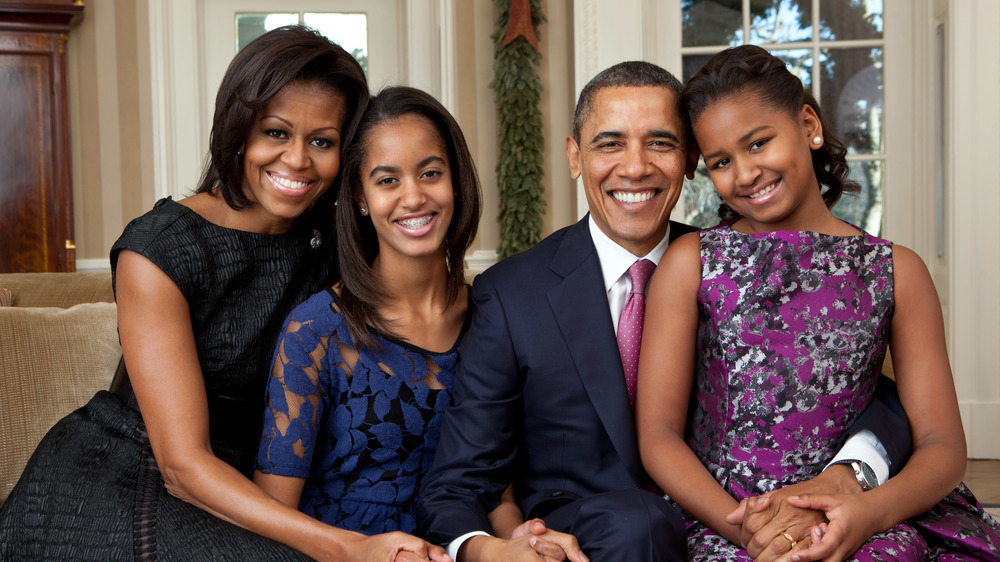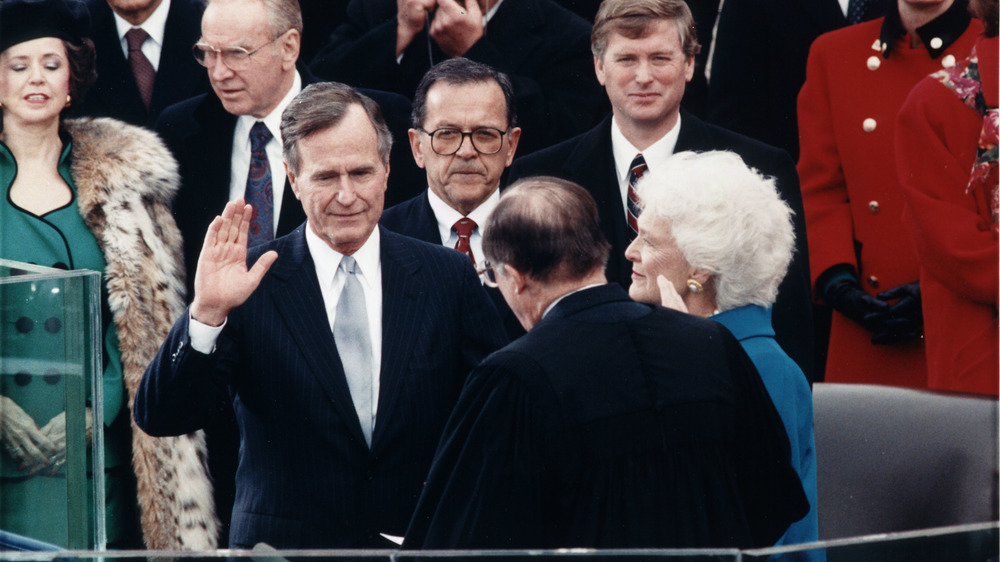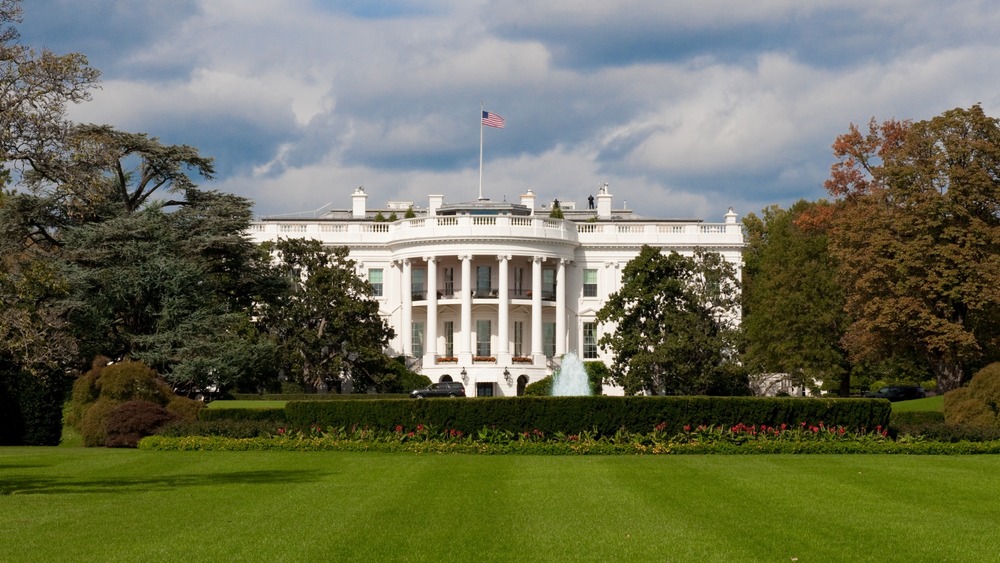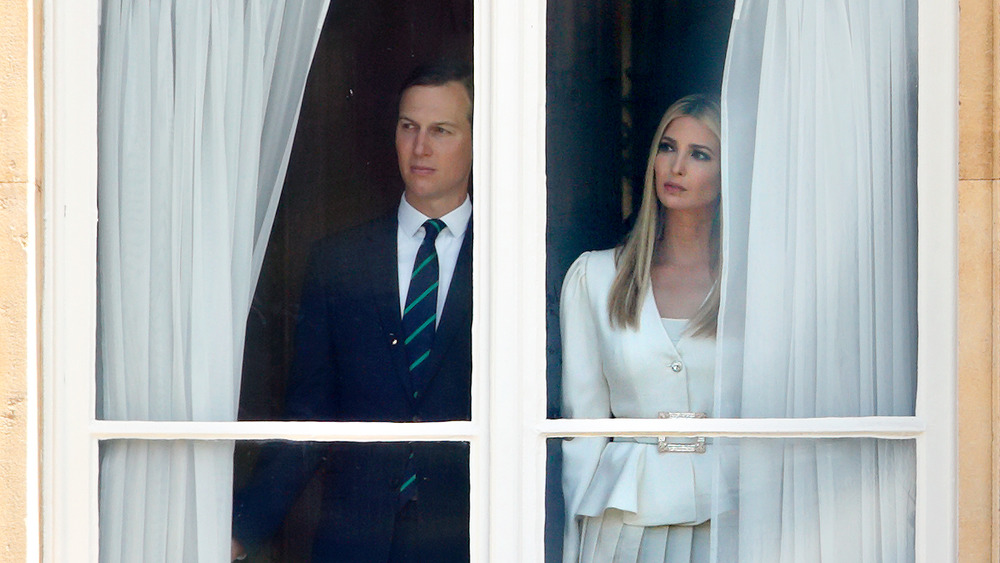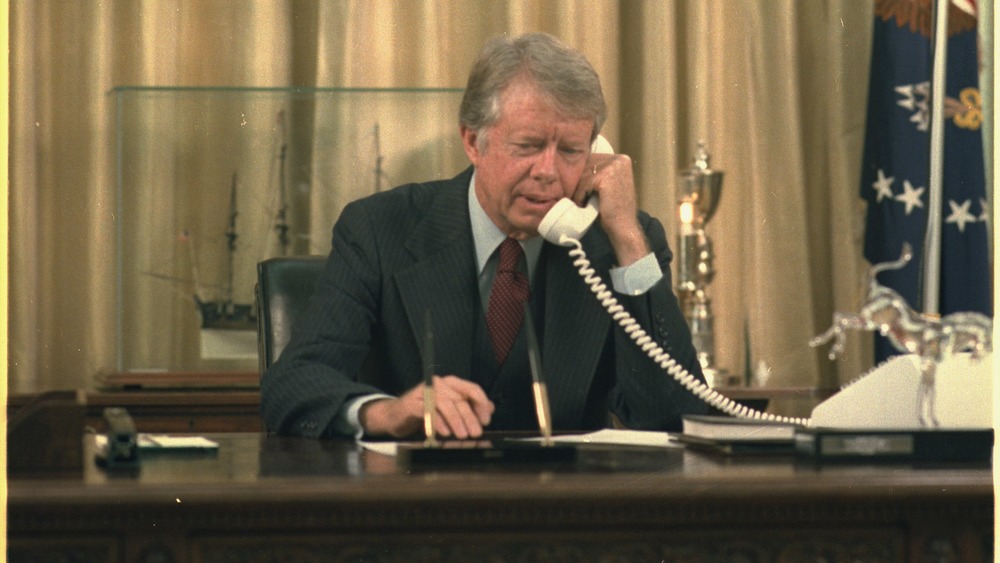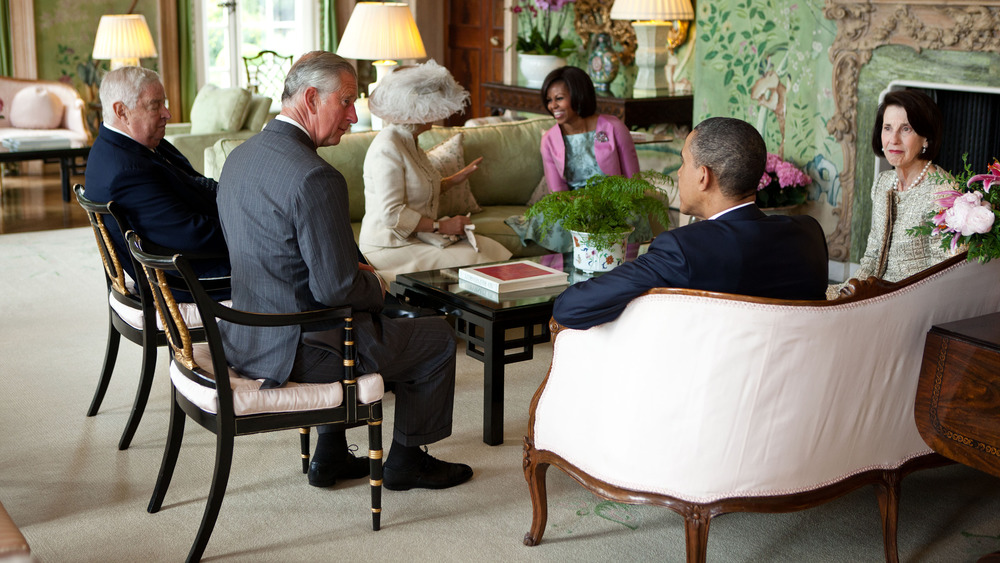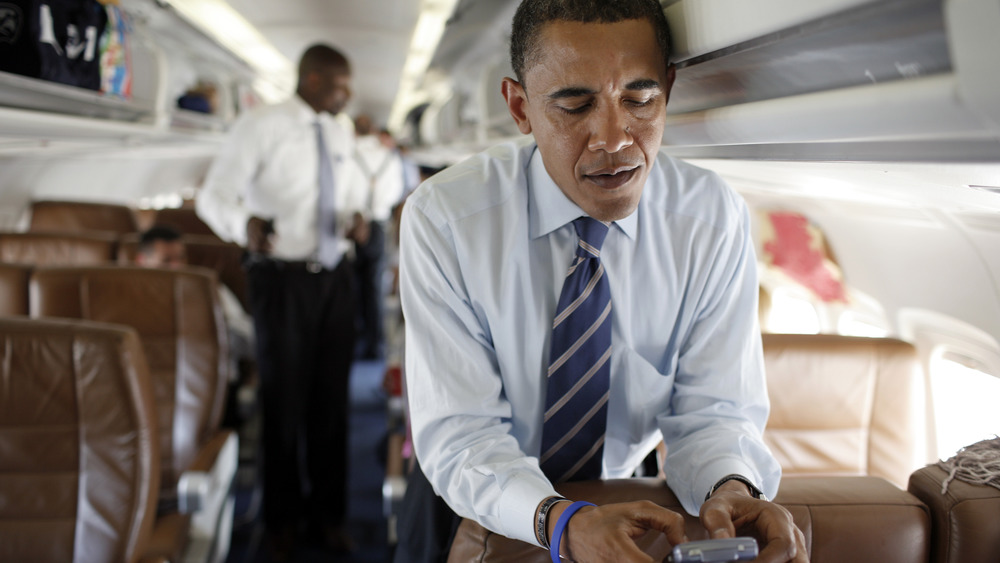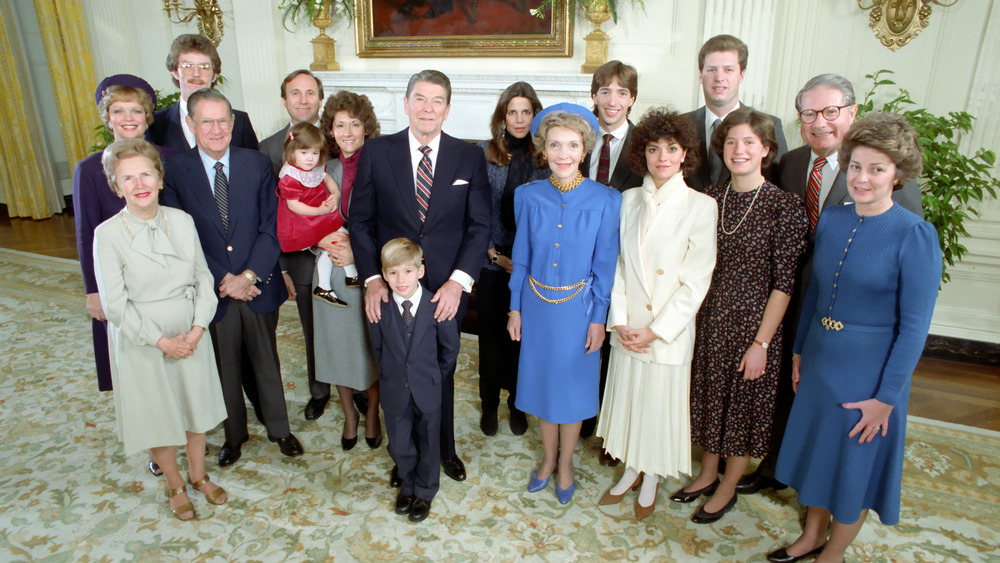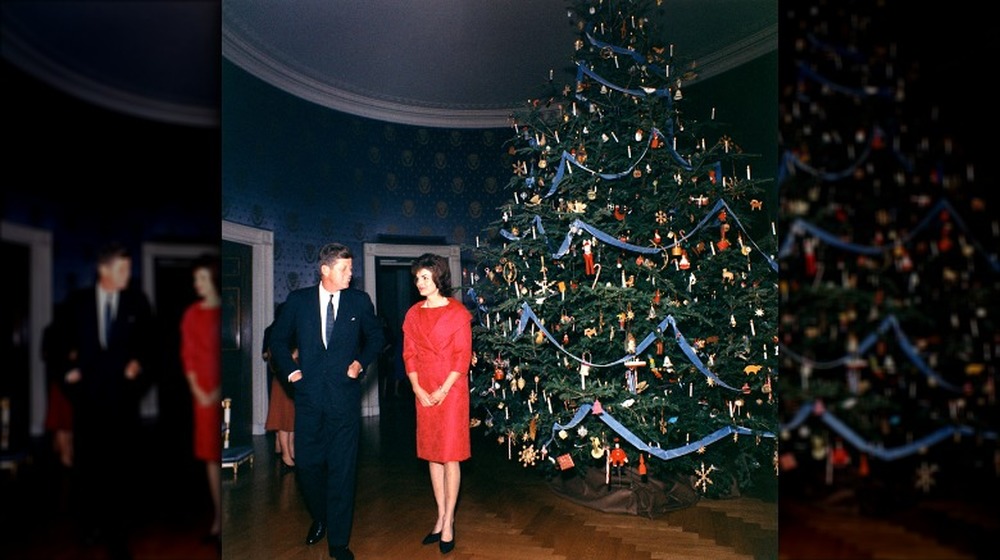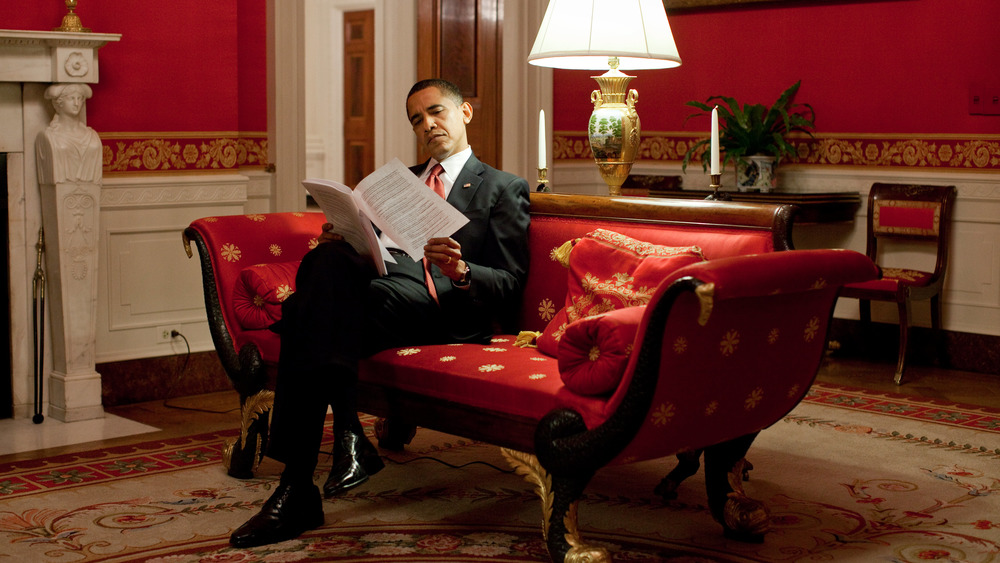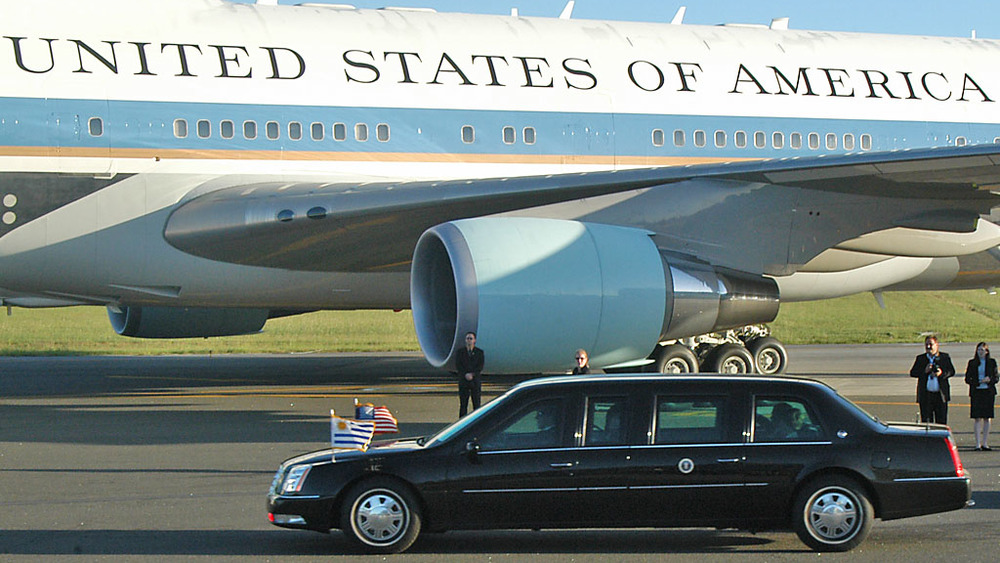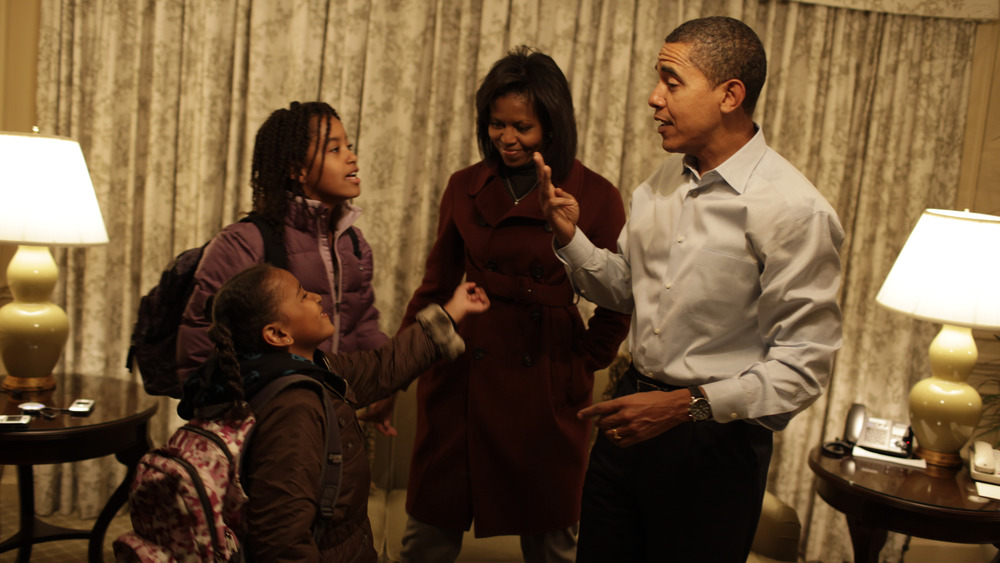Rules The First Family Of The United States Have To Follow
Few amongst us think that winning a term as the president of the United States is an easy job. Neither is the term after, where a president has to carry on with duties that seem bound to displease someone, regardless of their political positions. They and their family members are also subject to sometimes punishing scrutiny, with their every move seemingly put under a microscope and dissected by pundits, political rivals, and everyday folks.
At least they get a pretty cushy life, right? Former President Gerald Ford did jokingly call it "the best public housing I've ever seen," according to The White House Historical Association. But it's not quite so simple. President Harry Truman also called it a "glamorous prison," after all.
Even for modern first families, life in the White House and beyond comes with a bevy of rules. Some make sense, but other edicts surrounding life as a president's family member may surprise you. They range from things as simple as whether or not you can open a window to big disappointments, like what happens to those state gifts handed over by foreign dignitaries. These rules show that being part of the first family can be surprisingly complicated, with effects sometimes lasting long after the White House is in the rear view mirror.
Move-in day gets chaotic at the White House
The lead up to January 20, better known as Inauguration Day, gets pretty busy for the first family. There are transitions to manage, staff and cabinet positions that need new people, and a multitude of meetings and briefings. Even seemingly boring stuff like moving vans needs attention. What makes it all the more tumultuous is the fact that the newbies can't move in even a minute early.
CBS News reports that incoming first families and their staff aren't allowed to move into the White House until around 11 a.m. in the morning. That's when the outgoing president, the incoming one, and their entourages all head off from a hopefully civil coffee date to the inauguration. While they're ceremonially switching over presidents, a full move-in team leaps into action. Their mission? To move out all of the old stuff and bring in the new.
This massive undertaking doesn't just involve luggage or furniture. Move-in day can also mean repainting some areas, changing out carpets, and setting things up like the new first family has always been there, down to the toiletries in the bathroom cabinet. West Wing staffers, meanwhile, aren't allowed into their new offices until the president's officially in, which means they might be waiting for hours. To help with the effort, some outgoing staff members reportedly work for up to a week without their personal objects, all so move-in day can speed along as quickly and efficiently as possible.
The first family has to figure out how to get their stuff into the White House
Though practically every modern first family has had an extensive team to help them move into the White House on Inauguration Day, the onus of that move falls squarely on their shoulders. Slate reports that President Barack Obama was responsible for moving his and his family's stuff all the way from Chicago to a storage facility in Maryland, and then onwards to the White House in Washington, D.C. Like other president-elects, he had to use either his own money to cover the costs or could legally use funds from his campaign and transition.
Presidents and their families don't move in a vacuum, however. The Secret Service supervises the process, providing an escort for moving vehicles and vetting each item that enters the White House. A chief usher is also on hand with blueprints and photos to make sure each item lands in its correct place. Some costs, like overtime for staff and costs like packing for the outgoing president, are covered by the executive residence budget, as the White House itself is a government building. Even then, an incoming president and their family is sure to expect a pretty hefty bill, maybe served on an antique platter, after all the dust has settled.
The first family can't touch windows
Consider the simple pleasure of opening a window. Maybe it's a little stuffy in your house, especially if you happen to live in, say, a Neoclassical mansion that's been continuously inhabited since the 19th century and has a full staff walking around everywhere. It would be lovely to just open a window or two and get a fresh breeze going, right?
Well, if you're a member of the first family, too bad. Those windows pose a pretty significant security risk. If you try to open one, it's all but certain that you'll have a member of the Secret Service at your side in a moment, respectfully asking you to take your hand off the sill. Same thing if you attempt to roll down the window in your motorcade. First lady Michelle Obama told Vogue that one of the things she looked forward to most in her post-White House life was this very action. She recalled that, as a treat, her Secret Service lead agent once allowed her to roll down the car window for a mere five minutes on the way to Camp David, the president's country retreat.
This rather intense restriction wasn't unique to the Obama White House. The Guardian reports that Brigitte Macron, the first lady of France, said Melania Trump also wasn't allowed such a simple freedom. "She can't go outside," Macron told reporters, noting that she was free to stroll through Paris as she pleased.
The president has to plan their own final send-off
Within the first two weeks of their term, the president has to have a plan ready — not for their goodbye to the office four or eight years later, but a far more irrevocable goodbye. This means that, by the time February is finished, the president should have planned their own funeral, Elle Decor says.
It makes sense, when you think about it. A president of the United States is in a politically tenuous position that could even put them in mortal danger if they cross paths with the wrong person. As per the National Archives, four sitting presidents have been assassinated, with yet more surviving failed attempts on their lives.
So, grim as it may be, it makes sense for a president to make their wishes for their funeral and burial arrangements known. The U.S. government, much like any other administration, is a complex thing that needs as much planning as possible. It would at least ease things somewhat if a team already knew what a deceased president wanted, whether they passed from natural or unnatural causes. Still, it must be a chilling thing to put down on paper, both for the president and the rest of the first family.
No one in the first family gets to keep those snazzy gifts
Though it's clearly a high-pressure job, surely there are some bright spots to being a member of the first family. Think on all of those diplomatic trips, the far-flung locales, the interesting people one gets to meet, and, of course, those nice gifts given to you by presidents, premieres, popes, and more.
Well, except you don't get to keep any of those presents. Oh, you thought those were for you? Of course not. According to the Congressional Research Service, the president legally cannot receive personal gifts from foreign dignitaries and members of state, assuming that said gift is more than "minimal" value. That would skirt far too close to bribery, you see. The same rules apply to the first family.
Gift giving still happens, though, so what's the deal? Instead of personally accepting an ultra-valuable bauble, the president or other member of the first family is actually accepting it on behalf of the United States and its people. It eventually gets passed into the hands of the National Archives and Records Administration, where it presumably goes to sit in a vault somewhere and gather dust forever.
The president and their family are supposed to lock down their cell phones
Cell phones are ubiquitous nowadays, but they can be vulnerable to attacks from hackers. That's bad enough for everyday folks, but consider the issues that might come up for the president and first family. They could get some very sensitive messages and calls that come through on their mobile phones, to the point where national security might be at risk.
That's why most presidents and their families have installed rigorous security features on their phones, Politico reports. That includes routinely switching out phones and allowing security experts to take a look at their devices on a regular basis. President Barack Obama reportedly handed his phone over every month so staffers could make sure he hadn't been hacked or had his communications otherwise compromised. However, this isn't a hard and fast rule. Donald Trump, the 45th president of the United States, repeatedly declined this advice, saying that the bother of taking security measures was "inconvenient." Unlike previous presidents, Trump's phone has also been equipped with a camera and microphone, making security-focused staff members even more nervous.
The first family must pick up the tab for basics
The first family hardly gets a free ride during their time in the White House. According to CNN, the president and their family can rack up quite a bill for themselves, between personal costs, food bills, and, sometimes, legal fees. Hillary Clinton, who served as first lady during her husband Bill Clinton's two terms in office from 1993 to 2001, even went so far as to say that her family left the White House "dead broke." Given the legal costs incurred during President Clinton's impeachment trial and the Monica Lewinsky scandal, that's pretty believable.
Former first lady Laura Bush backed up this claim, though her own husband appeared to steer clear of the personal scandals, at least. In her memoir, Spoken From the Heart, Bush wrote that "the presidential room, as it were, is covered, but not the board." Thankfully, at least from her perspective, there is the fact that "Presidents and their families are fortunately not responsible for a White House mortgage or the White House utility bills." Given the presumed costs of maintaining a building that's over 200 years old, presidential families should be grateful that they're at least spared this cost.
The Obamas also had to pay for their own meals, including, as The Guardian reports, their Thanksgiving dinner. Their personal costs also included mundane things like clothes, toiletries, and private parties like the one Obama threw for his wife Michelle's 50th birthday.
The first lady is expected to care about interior decorating
While the president is off doing the business of running the country, the first lady must contend with her own roles. A few of these tasks might be tough for someone who doesn't necessarily consider themselves to be stylish or fashion forward, but tradition and outside pressure dictates that they at least put forth an effort.
First ladies are generally expected to put their own spin on the inside of the White House, to the point where many have hired their own interior decorator to spruce up the look of the place. Architectural Digest writes that the modern version of this tradition largely stems from first lady Jackie Kennedy, whose extensive restoration efforts eventually made it to a live television broadcast. Both Michelle Obama and Hillary Clinton made an effort to include the work of American artists in public and private spaces throughout the White House. Earlier first ladies took it even further, as when Bess Truman had the deteriorating structure gutted and completely refurbished in 1948.
First ladies are also supposed to extend this energy into the holidays. Beginning in the 20th century, says The White House Historical Association, the first lady began to pick an annual Christmas theme, complete with elaborately decorated trees and other holiday decorations. Currently, there's no word on whether or not a hypothetical first gentleman would be expected to care about an official state Christmas tree or redoing the wallpaper in the master bedroom.
Family members have to keep their hands off the historic rooms
Though the first family is traditionally supposed to manage things like redecorating, some historic rooms are off limits. In fact, according to the JFK Presidential Library, first lady Jacqueline Kennedy pushed to have the White House officially declared a museum, which it was in 1961. This means that, though the first family can put their mark on some parts of the White House, they have to follow strict rules while doing so. Sometimes, they're not allowed to even think about touching the most historic parts of the building.
The historic nature of the White House is such a big deal that, as Smithsonian Magazine reports, the building even has its own curator. This is no small job, either. The White House curator must care for an estimated 50,000 pieces in the permanent collection. They sometimes also have to gently lay down the law, while also considering that the building is also a home that's subject to a semi-chaotic changeover every four to eight years, as presidential administrations move on.
The upside of this, says Slate, is that the first family at least has a high-class collection of artworks and objects they can carefully sort through and use to decorate their spaces. They just have to remember to respect the historic space in which they live and also to play nice with the current White House curator.
Presidents aren't allowed behind the wheel
For many adults, driving themselves around is a privilege that they may not even recognize as such. Indeed, they may dream of the luxury of having a dedicated driver who will motor them about town as needed.
For presidents, however, that luxury may start to seem restrictive after only a short time. For, as CNBC reports, presidents aren't allowed to drive on public roads. The rule also applies to vice presidents, as well as former holders of either office. In 2017, former President George W. Bush revealed to Jay Leno that he hasn't driven on a public road in 25 years because of this rule.
Technically, it's not a law, but this directive is pretty strongly encouraged for security reasons. According to The Sydney Morning Herald, the president or vice president and their entourage are usually driven by Secret Service agents, who have extensive training in evasive and defensive driving. Hilary Clinton, whose runs as a presidential candidate and term as Obama's secretary of state garnered her own security detail, has said that "One of the regrets I have about public life is that I can't drive anymore."
A president might be able to drive themselves if they're on a private road, but they almost always have an agent right next to them, in case something goes wrong. For many, that's the only chance they have to get behind the wheel once the White House has entered their life.
They're supposed to let kids rolls eggs on the White House lawn
Some of the rules the first family are obliged to follow are odd but at least make a little more sense when you consider things like national security or maintaining the historic integrity of the White House. Others are a bit more odd. Consider the annual White House Easter Egg Roll.
According to History, the tradition got started in 1876. On Easter Monday of that year, an estimated 10,000 children made their way to Capitol Hill, carrying colorful dyed eggs. The area was just perfect for the old occupation of egg rolling. The kids tore up the lawn, however, and Congress told them they were no longer welcome. Two years later, a group of kids approached the White House and asked if they could use the mansion's lawn for egg rolling purposes and to avoid the killjoys on Capitol Hill. President Rutherford B. Hayes gave them the go-ahead, and an official annual tradition was born.
The White House Easter Egg Roll has now been going on for well over a century, says the White House. There have been a few interruptions, namely during World Wars I and II, as well as during White House renovations in the 1950s. It's traditionally hosted by the first lady and the rest of the first family, who also need to think about the design for a custom wooden Easter egg given to attendees, a tradition begun by first lady Nancy Reagan.
Some first kids still have to do their chores
Though they all have lived in a fancy historic mansion with a full staff on call, many first kids have been expected to do their part. For quite a few, that's meant a burden common to many kids throughout the nation: chores.
Of course, this will vary from family to family. The New York Times reports that the Obamas were especially adamant that their daughters, Sasha and Malia, were expected to continue with their chore list even though they'd moved into one of the most famous homes in the nation. That included setting their alarm clocks, making their own beds, and general tidying around their rooms.
First lady Michelle Obama even made sure to let the staff know that they could skip making the first daughters' beds. "They have to learn these things," she said, via the BBC. Many have agreed that routine and structure is important for children growing up in the White House, where intense public scrutiny can be punishing for adults as well as kids. That also means a few exceptions here and there, like ice cream at an event or an episode of Hannah Montana on occasion.
